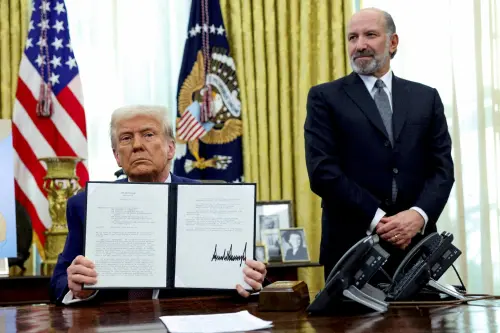This week, Governor Kelly of Kansas and Governor Parson of Missouri signed a joint agreement to end the longstanding economic border war between their two states. For years, Kansas and Missouri taxpayers subsidized the shuffling of jobs across the state line that runs down the middle of the Kansas City metro area, with few new regional jobs to show for it. The firm poaching captured national headlines, branding these two states’ practices as the poster child for how not to create jobs.
Governor Kelly and Governor Parson thus get full credit for doing what is common-sense, forging a bipartisan compact that eluded their predecessors.
Yet this historic handshake ought to be the beginning, not the end, of economic cooperation. The two states, with their local partners, should usher in a broader approach to economic development, rooted in collaboration and the regional assets that matter to the future economy.
To be clear, this truce is an important first step. It also happens to be good policy and good politics.
Economists are famous for arguing about trends and methodologies. But one area in which they have consensus is on the ineffectiveness and inefficiency of state and local economic development subsidies. Rarely do such subsidies sway business location decisions. Rarely do they create more jobs than without a subsidy. And rarely do they generate more income than they cost a community from lost tax revenue or the additional public investments needed to accommodate the new business.
In addition, a recent Washington Post-ABC News poll found that a majority of registered voters believe the U.S. economic system mainly favors corporations and those in power rather than all people. In fact, two-thirds of independents believe the economy and its system of rules and actors do not benefit them. The highly visible search for Amazon’s second headquarters further fueled this sentiment, stirring a public backlash to giving firms tax giveaways at a time when workers are barely seeing their wages improve. So even if corporations seek incentives, the voting public expects their elected officials and economic developers to do their job and keep the community benefit front of mind.
However, the primary reason to get off the addiction of economic incentives is because it is the wrong tool for helping states and regions prepare for the modern economy. This understanding is driven by three primary realities.
First, the vast majority of job growth in a state comes from the expansion of existing businesses and startups, not from business relocations. According to one study, on average, 87% of state job growth comes from homegrown firms and entrepreneurs, not luring companies from elsewhere.
Second, and most fundamentally, we are in the midst of a winner-take-most economy. Superstar cities like San Francisco, San Jose, Austin, and Boston are capturing an ever-growing share of the nation’s innovation jobs and talent. Meanwhile, many mid-sized cities in the middle of the country lack the critical mass of knowledge assets, such as applied R&D capability and specialty skilled workers, to keep pace.
Finally, the growth in new technologies is automating some jobs and tasks while placing a higher demand for a different kind of workforce. By our estimate, one-quarter of jobs in Kansas and Missouri are at “high-risk” of automation. Those most vulnerable are less educated workers, young adults, men, and black and Hispanic workers, many of whom are employed in “high-risk” sectors such as food service, logistics, and retail. Meanwhile, the durable jobs that pay well generally require workers to have at least some college education or technical training, and human capabilities like teamwork and emotional intelligence that cannot be easily replaced by machines.
Luring jobs with tax incentives is a minuscule activity that addresses none of these structural challenges. In fact, tax abatements for business recruitment is a distraction. They steal limited time and resources away from critical services that help local businesses and workers adapt.
Given these realities, Kansas and Missouri must not simply stop poaching each other’s jobs. They must also start rethinking how they pursue economic development in the modern era.
To that end, state and local leaders must embrace a vision of regional economic development that is comprehensive in scope, collaborative in spirit, and inclusive, improving incomes and employment for everyone, no matter their race or zip code.
That starts by de-emphasizing economic development incentives. While this border war agreement applies to the Kansas City area only, Missouri and Kansas can go further and make the use of incentives rare, targeted, and transparent—statewide. Local jurisdictions in the region can also follow through with their own incentives reforms, as the mayor of Indianapolis and the city’s partners did recently.
To be clear, this truce is an important first step. It also happens to be good policy and good politics.
Leaders must prioritize business dynamism, skills development, and quality places as pillars of economic development. While governors Kelly and Parsons joked this week about the need for retaining some healthy competition amid cooperation, the reality is that their states’ respective cities and regions will succeed primarily by growing from within. With educated workers flocking to already talent-rich cities, regions in Kansas and Missouri will need to rely on homegrown ability to start and scale new firms and launch new products and services.
Leaders will need to reach into every school and neighborhood to equip workers of all ages with skills that matter to promising industries, including supporting those who lose a job or need help with job transitions. And workers and firms can best access each other when neighborhoods and job centers are connected by quality transportation and housing options. All of this requires deep collaboration between a state and its regions, and among public and private sector leaders within communities.
This week, Governor Kelly and Governor Parson closed the confrontational chapter on their history of bi-state competition. The opportunity is now there for both states to put the unbalanced tax abatements and hollow business relocations in the past and move forward vigorously by focusing on building homegrown talent, enriching education opportunities, and ensuring that each state’s workforce can access quality transportation and housing. Residents in both states, and throughout the greater region, are now counting on this next chapter.
The Brookings Institution is committed to quality, independence, and impact.
We are supported by a diverse array of funders. In line with our values and policies, each Brookings publication represents the sole views of its author(s).







Commentary
The end of Kansas-Missouri’s border war should mark a new chapter for both states’ economies
August 14, 2019